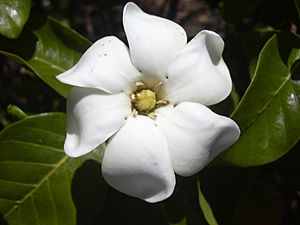Forest gardenia facts for kids
Quick facts for kids Forest gardenia |
|
|---|---|
 |
|
| Conservation status | |
| Scientific classification | |
| Genus: |
Gardenia
|
| Species: |
brighamii
|
Gardenia brighamii, also known as nānū, naʻu, or forest gardenia, is a special type of flowering plant. It belongs to the coffee family, called Rubiaceae. This plant is endemic to Hawaii, which means it naturally grows only there and nowhere else in the world.
Contents
What Does the Forest Gardenia Look Like?
The forest gardenia is a small tree that can grow up to about 5 meters (about 16 feet) tall. Its leaves are shiny and dark green. They are shaped like an oval and are usually between 2.2 and 10.5 centimeters (about 1 to 4 inches) long, and 1.5 to 5.5 centimeters (about 0.6 to 2.2 inches) wide.
The flowers of the nānū are white and grow one by one. Their petals are joined at the bottom, forming a tube that is about 15 to 20 millimeters (about 0.6 to 0.8 inches) long. Each flower has six petals.
Pictures of the Forest Gardenia
Where Does the Forest Gardenia Live?
The forest gardenia grows in tropical dry forests. These forests are found at elevations of about 350 to 520 meters (about 1,150 to 1,700 feet) above sea level.
In the past, you could find this tree on all the main Hawaiian islands. But today, it only grows naturally on Maui, Molokaʻi, Oʻahu, Lānaʻi, and the Big Island.
Why Is the Forest Gardenia Endangered?
The forest gardenia is a very rare plant. There are only about 15 to 19 trees left in total. On Oʻahu, there are only two plants growing in the wild. On the Big Island, there is only one.
The biggest dangers to this species are:
- Loss of habitat: Many dry forest areas have been lost. This means the nānū has fewer places to grow.
- Invasive plants: Other plants, like fountain grass (Pennisetum setaceum), are not native to Hawaii. They grow very fast and take over the space and resources that native plants like the forest gardenia need to survive.
Because of these threats, the forest gardenia is considered a critically endangered species.
How Is the Forest Gardenia Used?
Native Hawaiians used the wood from the nānū tree for different purposes. They made kua kuku, which were anvils used to make kapa cloth. They also used the wood for pou, which were posts for building houses.
The fruit pulp of the nānū was used to make a yellow dye for kapa. The white, sweet-smelling flowers are still used today to make beautiful lei. People also grow the forest gardenia as an ornamental plant on the islands because of its lovely flowers and leaves.
See also
 In Spanish: Gardenia brighamii para niños
In Spanish: Gardenia brighamii para niños







